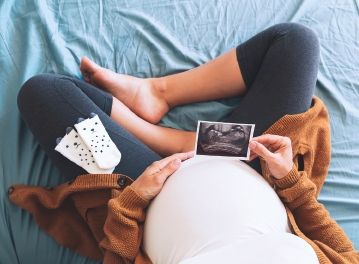
Natalia Deriabina / shutterstock.com
BALTIMORE—Understanding issues regarding pregnancy in women with rheumatic disease is important to patients and physicians alike, said Bonnie Bermas, MD, the Dr. Morris Ziff Distinguished Professor in Rheumatology at UT Southwestern Medical Center, Dallas, in her recent lecture at the Maryland Society for the Rheumatic Diseases.The physiologic changes in normal pregnancy, which include increased circulating plasma volume, hypercoagulability and an immunosuppressive state, reasonably prompt several questions in female patients with underlying autoimmune conditions. These topics of interest may include the impact of rheumatic disease on fertility, the likelihood of increased disease activity during pregnancy or poor pregnancy outcomes for baby or mother, and issues regarding which immunomodulating and immunosuppressant medications can safely be given in pregnancy.
Pregnancy & RA
Dr. Bermas began by exploring these subjects in patients with rheumatoid arthritis (RA). Although RA patients tend to have smaller families and take a longer time to achieve pregnancy than those without the condition, there is no indication of compromise of ovarian reserve as measured by anti-Müllerian levels, indicating that some of these epidemiologic findings may be due to patient family planning choices driven by perceived rather than objective concerns about pregnancy.1
The scientific literature supports the classic teaching that RA appears less likely to flare during pregnancy, although more recent studies indicate that only 50–60% of women may experience disease remission in pregnancy rather than the higher rates quoted by Hench and others in the 1930s.2
This does not mean that RA is without impact on pregnancy. Dr. Bermas noted that in a 2006 study of more than 1,400 pregnancies in women with RA compared with 4 million live births in healthy controls, the rates of hypertensive disorders, intrauterine growth restriction, premature rupture of membranes and prenatal hospitalization were all higher among women with RA.3 Women are at increased risk of disease flare following delivery; one study found that close to 40% of patients experienced an RA flare in the post-partum period.2
Complications in Lupus
Systemic lupus erythematosus is perhaps the condition of most interest to rheumatologists with respect to pregnancy complications. Many studies have evaluated the risk of lupus flares in pregnancy, and the results have not revealed a uniform picture. However, several risk factors have been discovered, including active disease at time of conception (as manifested by increased titers of antibodies to dsDNA and/or low complement levels), prior lupus nephritis, primigravida status, pulmonary hypertension, prior history of pre-eclampsia and discontinuation of hydroxychloroquine (HCQ).
The ability to measure HCQ blood levels has allowed for monitoring of adherence to therapy. Of note, a recent study from Dr. Bermas and colleagues indicates the proportion of women initiating HCQ during pregnancy increased from 2001 to 2015, but its overall use in pregnancy remains low.4
Several complications are associated with lupus: stillbirth, pre-term birth and low birthweight.6 Health threats to the mother are even graver, with higher rates of C section and increased risks for infections, thrombosis, pre-eclampsia and death.5
Differentiating pre-eclampsia from a lupus flare in pregnancy is often difficult and requires clinical judgment. Although not without exception, findings that may favor lupus flare include low complement levels, increased anti-dsDNA titer, leukopenia, thrombocytopenia, cellular casts and/or hematuria on urinalysis, and low uric acid levels.6 It’s helpful to collect complete blood count, urinalysis, baseline renal function, urine protein to creatinine ratio, anti-dsDNA titer, complement levels and uric acid level prior to pregnancy.
Relevant to both lupus and Sjögren’s syndrome are the dangers posed to the newborn in the setting of positive anti-Ro/SSA and anti-La/SSB antibodies. These antibodies are associated with an increased risk of neonatal lupus, which may declare itself with photosensitive rash, thrombocytopenia and liver function test abnormalities, and with a 2–5% risk of congenital complete heart block, with the highest association seen with anti-Ro/SSA antibodies.
In pregnant patients with anti-Ro/SSA and/or anti-La/SSB antibodies, performance of fetal echocardiograms at regular intervals during Weeks 18–26 of gestation is necessary to monitor for signs of congenital heart block. For treatment, IVIG has not demonstrated efficacy and, although fluorinated glucocorticoids have been used in clinical practice, data in the literature are not strong enough to support efficacy.

